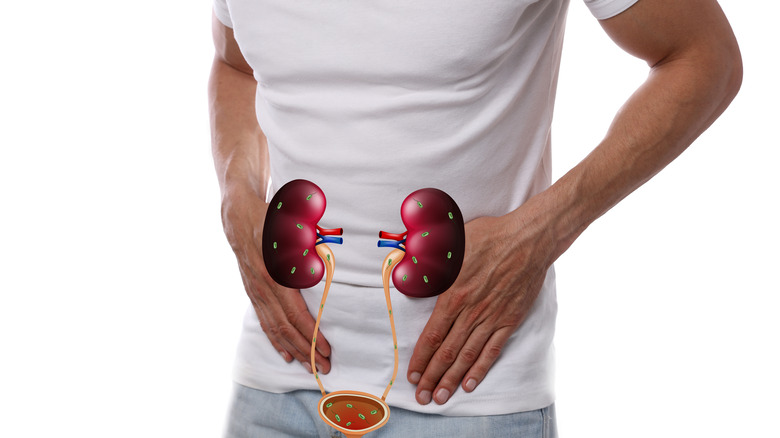Myths You Should Stop Believing About Men's Health
In our modern society, we are flooded with misinformation from everywhere — social media, advertisements, blogs, podcasts — it can be hard to tell fact from fiction. But one thing's for sure: Men often avoid going to the doctor. While there are many myths about men's health circling cyberspace and our social circles, this is one male stereotype that is in fact, true. According to a survey conducted by the Cleveland Clinic, 65% of men reported that they try to avoid going to the doctor as long as they can, and a whopping 72% said that they would rather do anything else, like household chores and scrubbing toilets, before visiting the doctor (via Healthline).
Dr. Tisha Rowe, founder of telemedicine network RoweDocs, believes there are a few factors that contribute to this phenomenon, including anxiety and the fact that "vulnerability sucks" (via Healthline). But going to the doctor doesn't have to be scary, and learning the difference between facts and myths about men's health can help dispel any fears you might have.
Myth: man buns and hats contribute to baldness
Don't worry guys — you don't have to sacrifice your fashion sense to preserve your hair. Wearing hats or embracing hairstyles that pull on your hair, like the infamous "man bun," do not cause male baldness or hair loss (via UAB Medicine). The idea that it does is just a rumor, and there is no scientific evidence out there that backs this claim. Hair loss in men is typically caused by genetics, nutrition, or vitamin deficiencies.
If you are experiencing hair loss and are bummed about it, you can talk to your doctor about things you can do to help mitigate the situation. There are prescription medications, over-the-counter drugs, laser treatments, natural remedies, and lifestyle changes you can make to help reduce your chances of hair loss (via Healthline). So go ahead and rock that man bun. That said, you might want to use a hair tie and not something like a rubber band, which can break and damage your hair (via Bustle).
Myth: breast cancer doesn't happen to men
Breast cancer doesn't just occur in women — men have breasts too. And while it is true that breast cancer is more common in women, men can still develop cancer in their breast tissues. The American Cancer Society predicts that 2,710 new cases of breast cancer will be diagnosed in men in the United States in 2022, and it's estimated that over 500 men will die from breast cancer in the same year. While the cause of most breast cancer in men is still unknown, there are some steps you can take to reduce your risk of developing it.
The American Cancer Society recommends maintaining a healthy weight, limiting your intake of alcohol, and exercising throughout the week to help lower your risk of breast cancer. An early diagnosis and swift treatment are key to surviving breast cancer, so this is definitely one reason not to avoid going to the doctor, especially if you are considered to be high risk. Men who have a high risk for breast cancer are those that are obese, over the age of 60, have a family history of it (via Men's Health), or who have certain genetic mutations that can be found with testing (via American Cancer Society).
Myth: tighty whities lower your sperm count
There is a myth floating around that close-fitting clothing like skinny jeans and "tighty whities" can actually lower your sperm count (via Johns Hopkins Medicine). This idea is based on the fact that sperm cannot survive in high temperatures. Our internal body temperature generally hovers around 98.6°F, which is too hot for sperm — they live in the scrotum, where it stays slightly cooler. Since tight clothing pushes the scrotum close to the body, the theory says, that close proximity could over-heat your sperm, and therefore lower your sperm count.
However, many scientific experts believe that the temperature change that might occur in this scenario is just not noteworthy enough to affect sperm count in any way. There's just not enough scientific evidence that supports this claim (via UAB Medicine). So if you're really concerned over the boxers versus briefs question, at least the health of your swimmers doesn't need to be a part of the decision-making process.
Myth: young men can't get Alzheimer's disease
While it's not common, it is possible for younger men to develop Alzheimer's disease. A total of 5% of men under the age of 60 can develop what's called early-onset Alzheimer's — some of them are even in their 30s and 40s (via Men's Health). The symptoms of early-onset Alzheimer's are similar to those of Alzheimer's disease, and they can be quite life-changing. Early symptoms include forgetfulness, asking the same question repeatedly, depth perception or vision issues, and extreme mood or personality changes (via Johns Hopkins Medicine).
Men who are at high risk of developing Alzheimer's disease, either early-onset or later on, are those with a family history of the disease. There is genetic testing available to see if you have the genes known to contribute to Alzheimer's, and if you possess those genes you can speak to your doctor about things you can do to reduce your risk (via Men's Health).
Myth: shaving encourages a thicker beard
Want a fuller beard faster? Shave and watch the magic happen! Men who can't grow a thick mustache or beard are oftentimes encouraged to shave because some people believe it helps facial hair grow back fuller, thicker, and more quickly (via UAB Medicine). According to Dr. Lawrence E. Gibson via the Mayo Clinic, this is simply not true. Shaving does not change consistency of facial hair or affect the rate of hair growth. It can appear that way, though, because when you shave, it flattens or dulls the tip of your hair. Then, when the hair grows back, the "stubble" stands out more, which can alter your perception of it.
Shaving simply removes body hair on the surface — it doesn't have any effect on the hair underneath your skin (via UAB Medicine). Whether you like it or not, your shaving habits will not affect how thick your facial hair is or how fast it grows. So if celebrating no-shave November is your thing, carry on.
Myth: osteoporosis only affects women, not men
Most men in America think that osteoporosis only affects women, but this is a dangerous misconception. Indeed, osteoporosis in men has recently been considered a significant public health issue (via National Institutes of Health). This myth was likely born because women are at a greater risk for osteoporosis at an earlier age than men due to menopause. Women can develop osteoporosis after age 50, while men are usually at risk after age 70. Now that men are living longer, osteoporosis in men is becoming more common (via UC San Diego Health).
Osteoporosis has no obvious symptoms until a bone fracture or break happens, so it's often referred to as a "silent disease" (via National Institutes of Health); which means it's very important to understand if you are at risk and what to look out for. Men are at higher risk for developing osteoporosis if they are older than 70, have other chronic illnesses, and use specific types of medications, including steroid medications used to treat asthma and rheumatoid arthritis. Certain lifestyle habits like smoking, high alcohol use, low calcium intake, and little physical activity also increase your risk. If you are high risk, it's a good idea to go to your doctor for a checkup so that if you do have signs of osteoporosis, you can work on prevention before a bone break occurs.
Myth: just consuming more protein will help men gain muscle
Some men seem to think that just adding protein to their diet is all they need to gain muscle (via UAB Medicine). However, just eating more meat or drinking more protein shakes isn't going to cut it. You have to put in the work too. Protein will help you build muscle when paired with exercise, like cardio workouts or strength training, but simply consuming protein and not working out won't do the trick. In fact, while advertising agencies do a great job at convincing us that we need more protein, in actuality, many Americans eat more protein than their bodies require. And when protein is consumed in excess, it can lead you to gain weight or experience other health issues like constipation, dehydration, or kidney problems. UAB medicine recommends that the number of grams of protein you consume should be commensurate with your body weight number in pounds (so, 150 grams of protein per day for someone weighing 150 pounds), as long as you exercise often.
Myth: age doesn't affect fertility in men like it does for women
Another big myth is that men are fertile forever. This misbelief probably stems from the fact that women have a firm stop on fertility when menopause hits, whereas men don't experience a tangible end to their child-fathering years (via Healthline). But while some men can still have children well into their 80s, most men experience a decline in sperm quantity and quality as they age.
For instance, Healthline describes one scientific study looking at in-vitro fertilization and intracytoplasmic sperm injection (when one sperm is inserted into an egg), which found that successful pregnancy rates declined dramatically as men aged. About 50% of the men in the study who were under age 35 had successful fertilization. As the age of the study subjects went up, the success rate steadily declined. Men over 51 were only able to have a successful fertilization about 30% of the time. Another scientific study published in Reviews in Urology showed that sperm count and sperm motility drastically reduce as men age.
Myth: the way you live your life won't affect your sperm
Sperm quality isn't only affected by your age — your lifestyle choices are a factor in sperm health as well. Unhealthy habits and decisions could lower your sperm count. For instance, one meta-analysis of twenty studies concluded that smoking cigarettes decreases sperm quantity and quality (via European Urology). Other lifestyle choices like high drug and alcohol use, obesity, stress, diet, and even drinking caffeine can affect male fertility, according to one scientific review (via the Arab Journal of Urology).
If you're concerned that your lifestyle isn't supporting your sperm count, there is one thing you can do to boost your numbers: Make sure that you're getting enough vitamin D. One meta-analysis published in the International Journal of Surgery found that good nutrition and healthy levels of vitamin D can help support male fertility. You can get vitamin D by spending time in the sunshine — just keep in mind that you don't need to bake under the sun for hours to get your necessary vitamin D, just 8-15 minutes should be sufficient (via Healthline). But what if you live in a place that doesn't get a lot of sun? You can also consume foods rich in vitamin D, like mushrooms, fish, other seafood, and egg yolks. Additionally, some foods or beverages on the market are fortified with vitamin D, like nut milks and orange juice. Or you could invest in a good quality vitamin D supplement.
Myth: erectile dysfunction only happens in older men
While erectile dysfunction (ED) is more common in older men, it is still possible for younger men to experience this problem. About half of men in their 50s experience some form of erectile dysfunction, with numbers going up with age (via UW Health). Current estimates are that 60% of men in their 60s and 70% of men in their 70s will experience mild, moderate, or severe ED.
However, a recent scientific study from The Journal of Sexual Medicine found that 25% of patients suffering from ED were under the age of 40. This means that 1 in every 4 patients who experience ED are in their 20s or 30s. The study authors note that younger men who experience ED were more likely to smoke cigarettes and use drugs when compared to older patients, which could be contributing factors. While ED can be embarrassing and hard to talk about, it is a completely normal and common occurrence; it's important to discuss this with your doctor to see what treatment options are available to you.
Myth: it's harder to keep an uncircumcised penis clean
Cut versus uncut: Which is better? One factor in this debate is the common misperception that circumcision is more hygienic (via Psychology Today). However, circumcised or not, it's generally pretty easy to keep a penis clean, as long as you know how. The main problem here is that because circumcised penises are more common, there is a lack of education around how to properly clean an uncircumcised one. As a parent, if you choose not to circumcise your child's penis, it's important to educate yourself and them on how to properly clean it.
When a baby with a penis is born, the foreskin is typically attached to the head of the penis. It's important to know that if it is not circumcised, there is no need to retract it and clean it for the first several years of life — not only is retracting it at this stage potentially painful, but it's unnecessary, as the foreskin serves as a protective barrier on the penis. You just clean it gently with soap and water like any other body part. Eventually, the foreskin will retract on its own, usually somewhere between the ages of 3 and 12. At that point, the child should be taught how to clean it on their own with water in the shower. It's that easy.
Myth: circumcision helps prevent urinary tract infections
The concept that circumcision can prevent urinary tract infections (UTIs) came from one scientific study that has a few flaws, according to Psychology Today. First, Psychology Today points out that the study was only performed in one hospital, and it didn't take into account if the babies were premature, which makes them more vulnerable to infection overall. It also didn't consider whether the babies were breastfed, as breastfeeding helps protect against UTIs. Additionally, there was no way to measure if the babies' foreskins had been mistakenly retracted by force, which can actually cause a UTI.
There have been other scientific studies that show no correlation between UTIs and circumcision; in fact, they show either no change in UTI occurrence with circumcision, or sometimes even an increase in UTI after circumcision. While the debate among many medical professionals continues, circumcision is generally not recommended to help reduce the risk of UTIs.
Myth: a routine checkup involves a prostate exam
If you avoid going to the doctor because you think that you'll have to get a finger-rectal exam, listen up: Most doctors don't recommend a prostate exam every time you get a checkup, especially if you are not high risk, according to Dr. Jonas Aharoni, writing for the Vancouver Clinic. However, if you're risk is high, it's a good idea to get a rectal exam or other additional tests.
So who is at high risk for prostate cancer? Men older than 50 and those with a prior family history are considered to be higher risk. Additionally, some genetic mutations may contribute to your risk, although this is believed to be a factor in only a small number of cases (via American Cancer Society). Prostate cancer is usually seen in North America, northwestern Europe, Australia, and the Caribbean islands, with lower case numbers occurring in Asia, Africa, Central America, and South America.
Myth: boys don't cry
There is a big cultural stigma in America against guys showing perceived emotional weakness (via Forbes), and survey data suggests men feel societal pressure to put on a tough face. This pressure makes it hard for men to talk about their mental health issues — according to the National Institute of Mental Health, men struggling with mental illness do not receive treatment as often as women. Nevertheless, men are more likely to commit suicide compared to women, suggesting that many men did not get the mental health support they desperately needed.
The shame around mental health struggles, especially in men, is most likely a contributing factor to why men don't seek help for these issues. But data doesn't lie — in the U.S. alone, more than 6 million men have depression and more than 3 million have anxiety (via Mental Health America) — meaning that if you experience one of these mental health challenges, you are not alone.
If you or someone you know is struggling with mental health or suicidal thoughts, please contact the Crisis Text Line by texting HOME to 741741, call the National Alliance on Mental Illness helpline at 1-800-950-NAMI (6264), visit the National Institute of Mental Health website, or call the National Suicide Prevention Lifeline at 1-800-273-TALK (8255).















